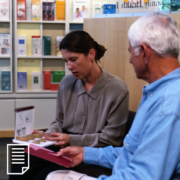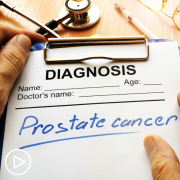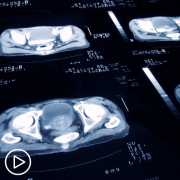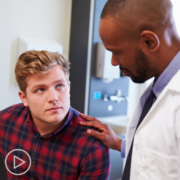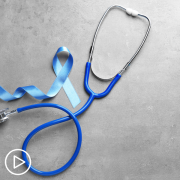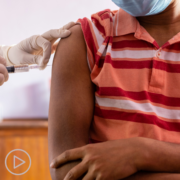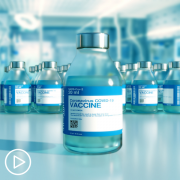Treatment Options for Advanced Prostate Cancer from Patient Empowerment Network on Vimeo.
What are treatment options for advanced prostate cancer? Expert Dr. Maha Hussain provides a breakdown of hormone therapy and explains how targeted therapy is used in prostate cancer care.
Dr. Maha Hussain is the Deputy Director of the Robert H. Lurie Comprehensive Cancer Center of Northwestern University. Learn more about this expert here.
See More From INSIST! Prostate Cancer
Related Resources
Transcript:
Katherine:
Now that we understand how test results can help inform a patient’s cancer and how it may behave. Let’s discuss how they can affect treatment options for men with advanced disease. First, let’s do a brief review of the treatment types currently available. There’s hormone therapy, right. What else?
Dr. Hussain:
Perhaps, it’s simpler if we focus on advanced disease, specifically metastatic disease.
So, if that’s the deal, then the backbone of treatment is hormone treatment. And it really is. We call it hormone, but technically it’s an anti-hormone. What we’re trying to do is shut down the hormonal pathway that stimulate the testes, which is the factory that makes testosterone. So, we are looking at shutting down testosterone production from the testes in order to starve the cancer.
Now, the male hormone is produced predominantly – somewhere about 95 percent of it is made by the testes, and then there are about 5 percent-ish that comes from other sources. These are, again, male hormones like the adrenal gland and so on. And there was a while ago some research – I want to say from the MD Anderson crowd, but this is two years ago – that suggested also that the tumor may start to make sort of in-house production of male hormone to support itself.
Now, having said that, again, testes continue to be the source of the majority of the male hormone. And so, historically, the first data that showed benefit was actually by surgically removing the testes, which is what we call orchiectomy or bilateral orchiectomy. And then medications began hitting the market and were evaluated in the late ’80s and then 1990s, beginning with Lupron – which by the way, in the ’80s, it was an injection that the patient had to give themselves every day, which is remarkable.
But even then, there is a personal preference by patients to go and take injections as opposed to go through surgery with orchiectomy. But still, I would say for some patients it may be an option until it ought to be discussed as an option. Then what we know is this, is because of the potential other sources for the male hormone, the concept of what we call combined androgen depravation was being evaluated.
And again, this goes back to the ’80s when the first drug was flutamide and then bicalutamide, and there are other drugs that became. And they kind of added a sprinkle, I call it, to survival. But it wasn’t dramatic, huge differences in survival. And so, generally, while we used it, everybody believed in using it. Moving forward, the drugs like abiraterone, enzalutamide, apalutamide are the three hormonal drugs that have demonstrated conclusively really an advantage in terms of prolonging life when added to the Lupron.
So, what I tell my patients is that, when it comes to hormone treatment there is really no way around it. You can delay it. Some people are exploring for some patients who don’t have a lot of cancer, maybe a couple of areas, maybe just do targeted radiation and then leave the person alone to buy them some treatment-free time.
And, to me, this is where the discussion that has to happen with the patient. What is the objective? Is the objective to kind of be ahead of the game and maximally treat the cancer with the hope of prolonging life? Or is the objective to delay treatment? And I would tell you that, with these types of conversation, nine out of 10 or 9.5 out of 10 men opt for moving aggressively up front with management. So, that’s that.
Now, the one thing I should point out, one of the trials that also was a landmark trial in this disease was the study CHAARTED, which was an intergroup clinical trial at the time it was designed, led by ECOG, and the PI was Dr. Chris Sweeney. I was part of the team that worked on the design also of the study.
And that was a trial that looked at adding docetaxel to hormone therapy, versus hormone therapy alone, to try to see if it adds something. Historically, all the chemotherapies prior to that that were added to hormone treatment for patients with newly diagnosed metastatic disease had not delivered. And docetaxel did.
However, one thing I should point out, based on that trial – and I don’t want to go into too much details for the sake of time – the patients that seemed to be benefiting were the patients that had more aggressive, more disease in their system. And so, liver metastases, lung metastases spread in the bone at different areas, not like few isolated areas in the spine or the pelvis, but much more than that.
And so, for the patients who have what we call high-volume prostate cancer based on scans – and I’m happy to explain what that means if it’s needed – these are the patients that I would offer either the docetaxel plus hormone treatment, which is the injection, or the injection plus the hormonal pills that I mentioned earlier.
Katherine:
What about targeted therapy? How is that used?
Dr. Hussain:
Okay. So, let’s begin with the molecularly targeted therapy. So, as we speak right now, for patients who have newly diagnosed metastatic disease that we call hormone-sensitive, molecularly targeted therapy is not standard of care. So, I would encourage patients who may qualify for clinical trial to be involved in those. The flipside is – we can talk about it – is that molecularly targeted therapies, specifically with PARP inhibitors have pretty much entered in the space of prostate cancer with a couple of drugs that were FDA-approved.
The other way of targeted treatment, which would be what we refer to targeted radiation, this would be a different story. This is not systemic treatment. This is a local treatment. And what is done is basically if patients do not have a lot of cancer in their body based on scans, and only certain areas, and they are starting systemic therapy, they can certainly consult with a radiation oncologist to target radiation to areas that are visible on scan. So, if somebody has a couple of, let’s say, pelvic bone lesions, maybe a lymph node, and they are already starting systemic therapy, they can consult with a radiation oncologist focal radiation. And so, that would be the general scheme.


